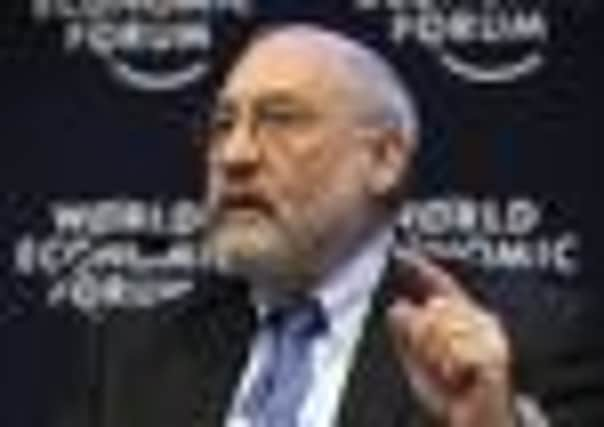Scots should keep pound, says Nobel winner Stiglitz


But Nobel prize-winner Professor Joseph Stiglitz also hinted that the country should be ready to adopt its own currency in the longer term.
Prof Stiglitz, a member of Alex Salmond’s Council of Economic Advisers, was among a group of experts who recently produced a report on the economic impact of independence .
Advertisement
Hide AdAdvertisement
Hide AdThe economist, from Columbia University in New York, was giving evidence by videolink to Holyrood’s economy committee yesterday.
“One of the things that was very important on that particular issue was the discussion of transition versus the long run,” he said.
“There was a concern over what were the factors that might make for a smoother transition.”
But he added that in the longer term, Scotland must adopt a more flexible approach and be ready “to move eventually to the institutional structure that will be appropriate for Scotland”.
In its report, the Fiscal Commission Working Group did say that Scotland is large enough to have its own currency if people vote ‘yes’ in next year’s independence referendum.
But it said: “On day one of independence, the members of the working group agree that retaining sterling would be a sensible currency choice that would be attractive both to Scotland and the UK.”
The report highlighted the strength of business links between Scotland and the rest of the UK as one reason for retaining the pound in a “sterling zone”.
Labour’s Ken Macintosh asked Prof Stiglitz if entering currency union with the rest of the UK is “essential for an independent Scotland”.
Advertisement
Hide AdAdvertisement
Hide Ad“Like any group report, it was a sense of the group, with differences. But for the report to have meaning, we all said there’s nothing that we felt was so outrageous that we wanted to dissent to,” Prof Stiglitz said.
The economist also told the committee that some of the cash from North Sea oil should have created “wealth above the ground”.
He said: “If an economy is growing, but it is growing on the basis of natural resources that are being depleted, that raises the question: is that sustainable?
“One of the questions many people are now asking about the UK is: was the so-called period of prosperity the UK had really a false prosperity where they took all the income coming in from the North Sea but rather than investing that in enhancing the human capital, the fiscal capital and the technical skills, a disproportionate amount of that went elsewhere?”
If natural resources are being depleted so that the country’s “wealth below the ground is getting less”, that should be offset by investment to “create wealth above the ground”, Prof Stiglitz said.
The academic was giving evidence on the need for different means of measuring a country’s wealth other than simply well-being.
He branded the US economy a “failure” in the early years of this century because, despite rising GDP, salaries were falling.
Instead, measures like education, security and the health of the nation should be considered, along with some measure of economic growth.
Advertisement
Hide AdAdvertisement
Hide AdJoseph Stiglitz is one of the most respected and well-known economists in the world. Two years ago he was named as one of the 100 most influential people in the world by Time magazine.
He is currently professor of economics at Columbia University. He won the Nobel Prize for economics in 2001 and was a member of the US Council of Economic Advisers from 1993 to 1995, serving as CEA chairman from 1995 to 1997 under Bill Clinton.
He was chief economist and senior vice-president of the World Bank from 1997 to 2000. In 2009 he was appointed by the president of the United Nations General Assembly as chairman of the Commission
of Experts
on Reform of the International Financial and Monetary System.